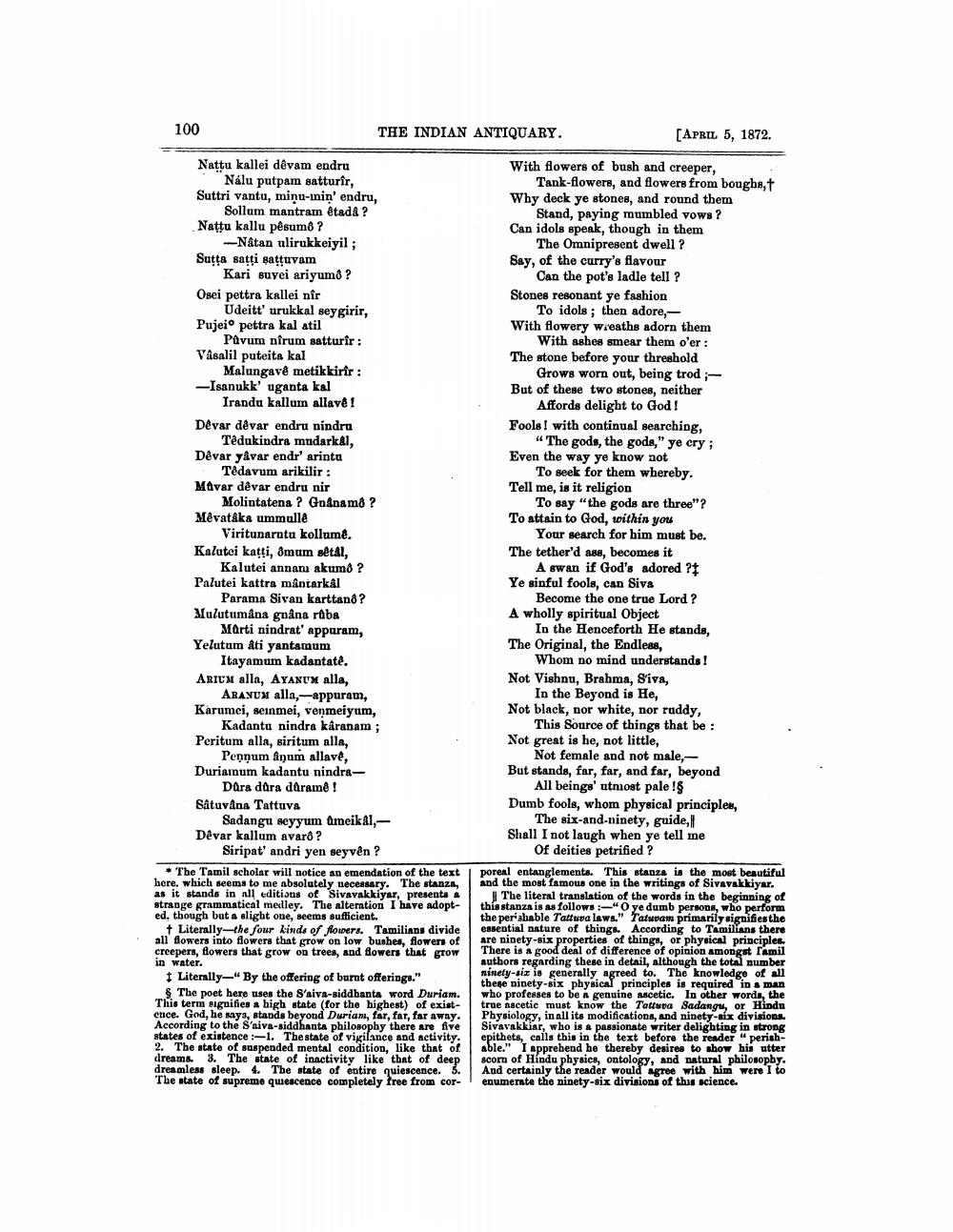________________
100
THE INDIAN ANTIQUARY.
[APRIL 5, 1872.
With flowers of bush and creeper,
Nattu kallei dêvam endru Nálu putpam satturîr, Suttri vantu, minu-min' endru, Sollum mantram êtada? Nattu kallu pêsumô?
U
-Natan ulirukkeiyil ; Sutta satti saṭṭuvam Kari suvei ariyumo? Osei pettra kallei nîr Udeitt' urukkal seygirir, Pujei pettra kal atil Pavum nirum satturîr: Vasalil puteita kal Malungavê metikkirir: -Isanukk' uganta kal Irandu kallum allavê! Devar dêvar endru nindru Têdukindra mudarkal, Dêvar yâvar endr' arintu Têdavum arikilir: Mavar dêvar endru nir Molintatena? Guânamo? Mêvataka ummullê Viritunarntu kollumê. Kalutei katti, ômum sêtål, Kalutei annanı akumô? Palutei kattra mântarkâl Parama Sivan karttand? Mulutumâna gnâna raba Marti nindrat' appuram, Yelutum âti yantamum Itayamum kadantatê. ARIUM alla, AYANUM alla, ARANUM alla,-appuram, Karumei, seinmei, venmeiyum, Kadantu nindra kâranam; Peritum alla, siritum alla, Pennum ânum allave, Duriamum kadantu nindraDůra dûra daramê! Sâtuvâna Tattuva Sadangu seyyum âmeikâl,Dêvar kallum avarð? Siripat' andri yen seyvên? The Tamil scholar will notice an emendation here, which seems to me absolutely necessary. The stanza, as it stands in all editions of Sivavakkiyar, presents a strange grammatical medley. The alteration I have adopted, though but a slight one, seems sufficient.
Tank-flowers, and flowers from boughs,† Why deck ye stones, and round them Stand, paying mumbled vows? Can idols speak, though in them The Omnipresent dwell? Say, of the curry's flavour Can the pot's ladle tell? Stones resonant ye fashion To idols; then adore,With flowery wreaths adorn them With ashes smear them o'er: The stone before your threshold Grows worn out, being trod ;But of these two stones, neither Affords delight to God! Fools! with continual searching, "The gods, the gods," ye cry; Even the way ye know not To seek for them whereby. Tell me, is it religion To say "the gods are three"? To attain to God, within you Your search for him must be. The tether'd ass, becomes it A swan if God's adored ?‡ Ye sinful fools, can Siva Become the one true Lord ? A wholly spiritual Object In the Henceforth He stands, The Original, the Endless, Whom no mind understands! Not Vishnu, Brahma, S'iva, In the Beyond is He, Not black, nor white, nor ruddy, This Source of things that be: Not great is he, not little, Not female and not male,But stands, far, far, and far, beyond All beings' utmost pale !§ Dumb fools, whom physical principles, The six-and-ninety, guide,|| Shall I not laugh when ye tell me Of deities petrified? poreal entanglements. This stanza is the most beautiful and the most famous one in the writings of Sivavakkiyar. The literal translation of the words in the beginning of this stanza is as follows:-"O ye dumb persons, who perform the perishable Tattuva laws." Tatuvam primarily signifies the essential nature of things. According to Tamilians there are ninety-six properties of things, or physical principles. There is a good deal of difference of opinion amongst famil authors regarding these in detail, although the total number ninety-six is generally agreed to. The knowledge of all these ninety-six physical principles is required in a man who professes to be a genuine ascetic. In other words, the true ascetic must know the Tattuva Sadangu, or Hindu Physiology, in all its modifications, and ninety-six divisions. Sivavakkiar, who is a passionate writer delighting in strong epithets, calls this in the text before the reader " perishable." I apprehend he thereby desires to show his utter scorn of Hindu physics, ontology, and natural philosophy. And certainly the reader would agree with him were I to enumerate the ninety-six divisions of this science.
of the text
† Literally-the four kinds of flowers. Tamilians divide all flowers into flowers that grow on low bushes, flowers of creepers, flowers that grow on trees, and flowers that grow in water.
of burnt offerings."
Literally" By the offering § The poet here uses the S'aiva-siddhanta word Duriam. This term signifies a high state (for the highest) of existcuce. God, he says, stands beyond Duriam, far, far, far away. According to the S'aiva-siddhanta philosophy there are five states of existence:-1. The state of vigilance and activity. 2. The state of suspended mental condition, like that of dreams. 3. The state of inactivity like that of deep dreamless sleep. 4. The state of entire quiescence. 5. The state of supreme quiescence completely free from cor




